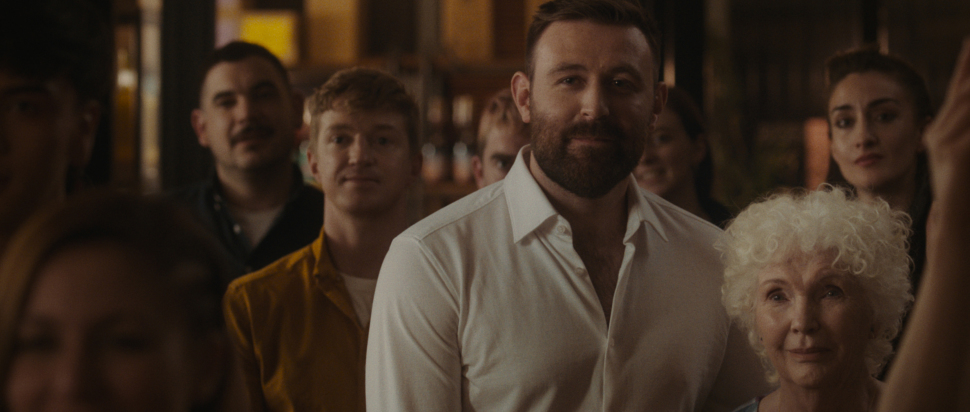James McArdle on Hamlet, baddies & new film Four Mothers
James McArdle is a familiar face from stage and television, but he's yet to lead a movie. That all changes with Four Mothers, in which he plays an Irish novelist caring for his elderly mother
James McArdle’s booming laugh is a great way to start the day. The Glasgow-born actor laughs when I tell him that my mum had texted me that morning about how he plays such a good “baddie”, like in his latest ITV series Playing Nice. “People usually hiss and boo at me,” he laughs. “I rarely get asked to do [comedy] on screen, only on stage.”
But deft and subtle comedic chops are what he brings in his latest venture, leading Darren Thornton’s latest film Four Mothers as Edward, a gay Irishman working as a successful YA novelist. Edward is also taking care of his mum who's recovering from a stroke – she's played with impish mischief by stage and screen legend Fionnula Flanagan (“very generous with her time,” McArdle beams when talking about her).
“It's the perfect film to take someone to after a nice lunch,” the actor says of Four Mothers, but don’t go in thinking it’s light fluff. The film is more like something by Pedro Almodóvar if the great director was Irish. It explores dynamics often ignored onscreen, like queer familial relationships in a formerly repressive culture and what it's like to be part of, what McArdle calls, a “nation of carers”.
Edward and his three pals, also all middle-aged and gay, are, like him, taking care of their elderly mothers. Hilarity and chaos ensue when his pals decide to dump their three mothers on Edward’s doorstep and sashay away to a Pride event in Spain. It's a wryly funny and heart-aching exploration of mother-son relationships, and how you can “absolutely adore your parents and love them and feel like they hold you back, all at once,” as McArdle puts it.
The film feels beautifully universal in its shades of light and dark, which is one element of the script that captivated McArdle. “The darkest moments of my life have been laced with absurdity and comedy, you know?” he says. “The absurdity of being alive, I think, is captured in the film perfectly.”
And this universality surpasses the specific algorithms that our media consumption is marketed towards; the film’s emotions transcend its specificity. Take your nan, take your mum, take your stepmum to the movie, McArdle says, but it’s also for everyone. “I just don't think real human beings think like algorithms, despite how we're told that we do. We see human struggle. We understand that all these labels and identities that are put upon us are external forces. I think we recognise universal things in each other.”
The film’s warm reception has pleasantly surprised McArdle – perhaps putting an end to people booing and hissing at him in the street. “When it won the audience awards for best feature at LFF [London Film Festival], I was doing a play [The Real Thing at the Old Vic],” he recalls. “I had to go into the box office to get tickets for someone and a guy came in and I thought he was going to say he enjoyed the play or something. He just said that he'd seen Four Mothers and that there wasn’t much on a surface level he thought he’d be able to relate to, but it had absolutely floored him.”
This echoes his own experience reading the script for the first time. “I find myself getting emotional even talking about it,” he laughs. “It's very rare. You know, it's happened to me a handful of times that a script just leaps out at me and I think, 'I've got to do this'. There’s something that I found so moving about these four women at the end of their lives. And this man who has so much life ahead of him and he isn't living, he's kind of in limbo.”
And it's these four women at the end of their lives who wake Edward up and teach him to appreciate what he’s been taking for granted all along. A line spoken by Gaetan Garcia's character Raf in the film – “Go to America or don't go to America. Just make a decision” – prompted McArdle to draw an unexpected parallel. “It's like to be or not to be!” he says. “Don't get me wrong, I wasn’t going to play Edward like Hamlet, but I kept thinking: he is a lot like Hamlet. Hamlet's a weird protagonist because he's quite passive, you know? There's the mother element with him too, and just like in this film, you're watching a guy try to make a decision.”
After my breezy chat with McArdle, I feel permission to accept the complex emotions our mothers can bring out in the best and most patient of us, even if I haven’t experienced caring for my own mum yet. It’s been cathartic, I tell him. “I don't know any adult child or parent who comes out of that experience unscathed in some way,” he says. “And it doesn't have to be huge traumatic things, just the kind of things that leave scars, wounds each other. But there is this… this unbreakable bond of experiencing life together.” After seeing this humorous and humanistic performance, McArdle will be Mr Baddie no more.
Four Mothers screens at Glasgow Film Festival on 3 & 4 Mar, and is released 4 Apr by BFI Distribution
Filmography (selected): Ammonite (2020), Mary Queen of Scots (2018), Star Wars: The Force Awakens (2015), '71 (2014)
TV credits (selected): Playing Nice (2025), Sexy Beast (2024), Andor (2022), Mare of Easttown (2021), Love and Marriage (2013)
Stage credits (selected): The Real Thing (2024), The Tragedy of Macbeth (2021), Peter Gynt (2019), Angels in America (2017), Chariots of Fire (2012)
